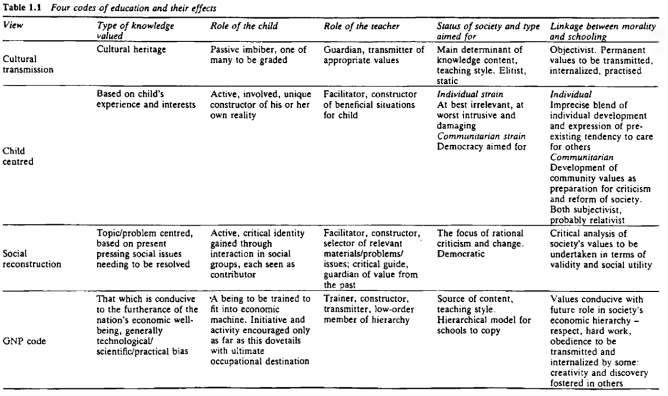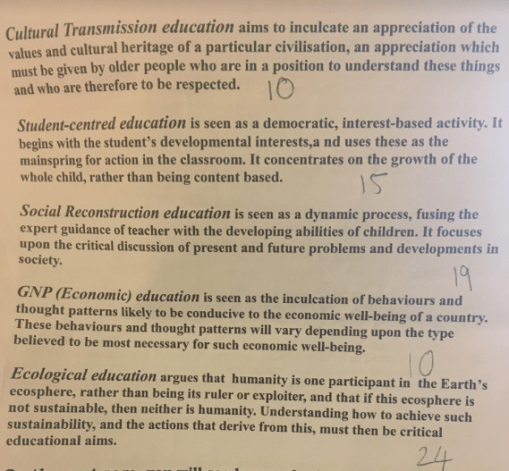During the face-to-face component of our PGCEi were introduced to Mike Bottery’s Educational Codes and Values (from The Morality of the School, 1990). Bottery outlined four codes which underlie approaches to education in schools. Here’s a grainy snapshot from Bottery (1990:7)
In an update from 2018, Bottery added an additional ‘Ecological code’.
During an input session we were asked to rate how much we agreed with certain viewpoints on education. Each viewpoint related to one of these codes. Note, the codes had not yet been introduced to us! It was then revealed which code each viewpoint corresponded to, and we tallied our rating points to see how much we aligned with each viewpoint.
This was me.
© University of Nottingham/Mike Bottery
The fact I aligned with the code of ecological education wasn’t really a surprise. I found those statements were more leading than others, and I felt I almost had to give them high ratings in case the rest of my PGCEi cohort felt I had no sense of ethical/moral duty(!). So, I kind of rigged it. Example statements.
Even so, I was quite surprised at what came out second place – social reconstruction education. I didn’t think that I would place such a high value on the social reconstructive value of education compared to both cultural transmission/economic code. Sure, this was a just a quick intro activity and wasn’t meant to be comprehensive. Nevertheless, I assumed that having spent a while working at for-profit EFL language schools, with many of my learners keen to acquire English as a form of cultural capital, I guess I assumed I’d have a more balanced, maybe pragmatic view. I reflected on this in a recent essay, basically concluding that I have two viewpoints on education: one as an educator in general, the other as an EFL teacher. Urgh, what does this all mean now I’ve moved into EAL???
Had the wording of the statements been slightly different, I probably would have come out with even higher ratings for social reconstruction too. I totally agreed with some statements, like…
- ‘Learning should be an active social process which is guided but not dominated by teachers’
Of course! I mean, that’s pretty much one of the guiding principles of Communicative Language Teaching as I understand it. Not that I’ve ever taught a pure form of CLT or anything…
But there were other statements which I was iffy on…
- ‘Teachers should help students in the process of understanding, appreciating and criticising and when older, changing society’s norms and institutions’.
I feel like there’s one side of me that agrees with this statement. Then there’s my experience of working in countries underpinned by Confucian values which emphasise social harmony, and my work in countries where the goal of the curriculum is to promote national unity. And… something in the statement just doesn’t feel right. I don’t like that it assumes change is necessary, I don’t like that it assumes people should be ‘older’ in order to initiate change (if needed), and I don’t like the use of ‘criticising’ instead of ‘critiquing’. Yet at the same time, I agree with the general idea of equipping learners with knowledge, skills, etc that will help enhance or improve society.
Anyhow, I think Chapter 1 of Bottery’s The Morality of the School is essential reading for any educator. Despite 10 years of teaching prior to reading this chapter, I don’t think I’d ever properly explored my own values as an educator – not in depth, anyway. Bottery is a great springboard into this topic, although it should be read with the usual caveats – the codes are generalisations, there’s crossover, they’re a snapshot of current values built around context/experience, etc.
Categories: General, reflections




Hi,
Thank you for posting, I have found your blog really useful when writing my assignment 1 on the PGCEi. I do have a question – I am writing about the ecological code and I have the book, Morality of school by Bottery, but that chapter is not in the book, do you have it by any chance? Thanks!
Best,
Kat
LikeLike